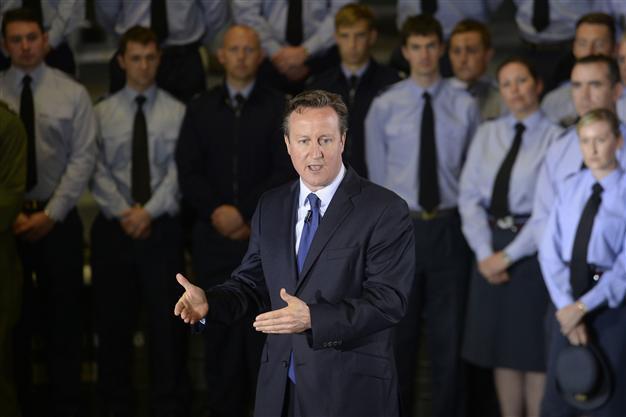PM Cameron says he wants Britain to do more to fight ISIL in Syria
LONDON – Reuters

British Prime Minister David Cameron addresses RAF airmen and officers during a visit to RAF Coningsby in Lincolnshire, central England on July 13, 2015. AFP Photo
Prime Minister David Cameron wants Britain to do more to help the United States destroy Islamic State of Iraq and the Levant (ISIL) in Syria, he said in an interview broadcast on July 19.
Britain conducts regular strikes against ISIL militants in Iraq but has so far limited its Syrian involvement to flying surveillance missions to gather intelligence.
Cameron failed to get parliamentary approval for military action against the forces of Syrian President Bashar al-Assad in 2013 but has asked lawmakers to consider whether Britain should now join U.S.-led strikes against IS in Syria.
“I want Britain to do more, I’ll always have to take my parliament with me,” Cameron told U.S. network NBC.
“We are talking and discussing at the moment, including with the opposition parties in Britain, what more we can do. But be in no doubt we are committed to working with you to destroy the caliphate in both countries.”
Government sources say he is expected to wait until after the opposition Labour Party elects its new leader in September to seek a fresh vote on bombing Syria.
On July 17, the Ministry of Defence said British pilots embedded with U.S. and Canadian forces had taken part in air strikes in Syria, angering some lawmakers who said the government had misled parliament.
In a speech on July 19, Cameron will say Britain also needs to do more to confront the ideology of extremism by promoting British values such as democracy, freedom and the rule of law and challenging “ludicrous conspiracy theories” of groups such as Islamic State in Iraq and the Levant (ISIL).
“We must de-glamourize the extremist cause, especially ISIL. This isn’t a pioneering movement, it is vicious, brutal, fundamentally abhorrent,” he will say, according to extracts released in advance by his office.
He will also issue a warning to those thinking of joining the around 700 Britons already thought to have travelled to Syria and Iraq.
